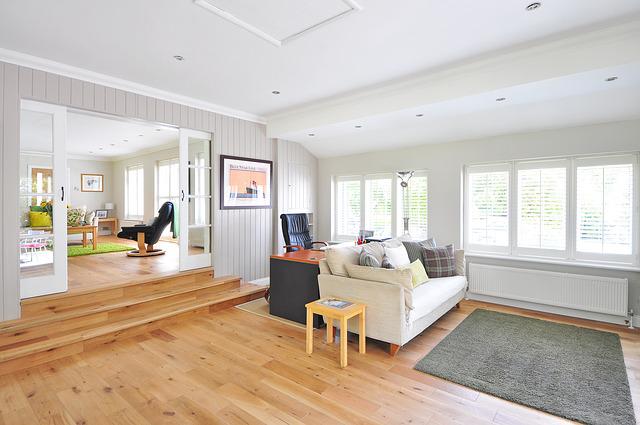The hardwood flooring industry accounts for a large share of the construction market, with an estimated reach of over $45.5 billion. Its steady growth stems from the high demand for hardwood, a building material many property owners and contractors consider an excellent solution for both interior and exterior flooring.
There is, however, a considerable amount of research and work involved in finding the right hardwood flooring manufacturer. This is especially true for commercial projects with larger scopes and costs. To ease the search process, this guide discusses essential qualities customers ought to look for in a hardwood flooring manufacturer.
First, let’s examine a few related areas before diving in.
Questions Every Property Owner Should Ask
A property owner should ask these questions before buying hardwood:
- What type of hardwood is required for the project?
- What is the budget size?
- What plans are in place to maintain the floor?
- Will the floor installation require a DIY approach or a professional contractor?
They not only serve as a guideline for the right hardwood flooring material but also reveal some valuable information about the project’s feasibility and requirements.
How to Choose Hardwood Flooring
Once there’s a clear understanding of the hardwood flooring requirements and budget, the property owner can select the material based on:
Flooring Type
The most popular types of hardwood flooring include:
Solid Wood
Solid wood flooring is milled from a single piece of hardwood and is available in a variety of widths and thicknesses. It can be sanded and refinished multiple times, making it a good choice for high-traffic areas.
Engineered Wood
This type of flooring is made of multiple layers of wood veneer and a plywood core. It can be installed over most types of substrates, making it a good choice for remodels. It comes in a variety of widths and thicknesses and can be sanded and refinished.
Laminate Flooring
Made from layered wood veneers bonded under heat and pressure, laminate flooring comes in different finishes and patterns. Its surface comprises a wood-like printed wear layer. It is easy to install and doesn’t fade, scratch, or stain easily. Plus, it can be easily replaced if damaged.
Wood Species
Each hardwood species has its own characteristics, including beauty, texture, colour, grain, resistance, and hardness. In general, the best hardwood for a project depends on the purpose and durability requirements. The most popular domestic wood species for flooring are oak, maple, and hickory. In the tropics, mahogany, teak, and Brazilian walnut are often used.
Grain Pattern
The wood’s grain pattern plays a significant role in how a hardwood floor looks. Flooring is available with a variety of different grain patterns. The three most common are:
Straight Grain
This is the most common type of grain pattern. The wood is cut in such a way that the grain runs parallel to the length of the boards.
Quarter-Sawn
This type of grain pattern is more expensive than straight-grain flooring, but it is also more durable. The wood is cut so that the grain is at a right angle to the length of the boards. This pattern results in a more uniform appearance and is less likely to show scratches and wear.
Rift-Sawn
As with quarter-sawn flooring, rift-sawn wood is more expensive than straight grain. The grain is cut at an angle, so the medullary rays (the lines that run perpendicular to the grain) are wider than the width of the boards. In addition, this pattern is durable and is less likely to scratch or wear over time.
Finishing Options
There are many different ways to finish a hardwood floor, and the most appropriate method depends on the type of wood, the desired look, and the level of traffic the floor will receive. Some of the most common finishes include:
- Stain: used to change the colour of the wood or to add a tinted finish
- Sealant: used to protect the floor from scratches, dirt, and moisture
- Varnish: used to give the floor a glossy finish and protect it from UV damage
How to Install Hardwood Floor
Before installing hardwood flooring, have a level surface to work with. If the surface is not level, use a screeding level or laser level to get it right. The hardwood boards should be installed in the direction of the longest dimension of the room.
The tongue and groove edges of the boards should be aligned and the seams should be staggered, creating a “checkerboard” effect. Use nails or staples to secure the flooring to the subfloor. Countersink them so that they are flush with the surface of the flooring.
How to Find the Right Hardwood Flooring Manufacturer
A good way to begin the search is to talk to contractors who have worked with hardwood floors and have good working relationships with certain hardwood flooring companies. These contractors use their preferred manufacturers, which they trust to provide excellent products at reasonable prices.
Another option is to search online to find companies that specialize in hardwood flooring and request a quote. Some of them offer free samples, while others provide free installation services when customers purchase their products. When comparing quotes, consider the following factors:
Variety of Hardwood Products
Wood species have unique colours and textures. So it’s important to find a manufacturer that offers a wide variety of wood types. In addition, wood finishes can also add different aesthetics to the floor. Manufacturers that offer multiple finish options provide a greater range of choices to match a customer’s specific style preferences.
Durability
One of the biggest benefits of hardwood flooring is its durability. It’s important to find a manufacturer that offers products with a long lifespan. Floors that are easy to maintain will also be more attractive to property owners and contractors.
Eco-Friendly Manufacturing Process
Eco-friendly flooring solutions are in high demand today due to concerns about the health and environmental impact of some conventional flooring production methods. Reputable manufacturers market hardwood materials that are harvested from sustainably managed forests or processed with low-impact manufacturing techniques, making them the right choice.
Expertise and Experience
An excellent flooring manufacturer is one that has been in business for a long time with a credible record. It indicates that the company has a deep understanding of customers’ needs and can provide expert advice and support throughout the buying and installation process.
Conclusion
Choosing the right hardwood flooring manufacturer isn’t difficult if property owners know what to look for. This guide should serve as a valuable resource for such individuals, who can start their search with the questions listed in the top section.



![OcuPrime Reviews [Exclusive Update] – Don’t Buy Until You Read This Report!](https://marylandreporter.com/wp-content/uploads/2022/06/Article-6-4-440x264.jpeg)



Recent Comments